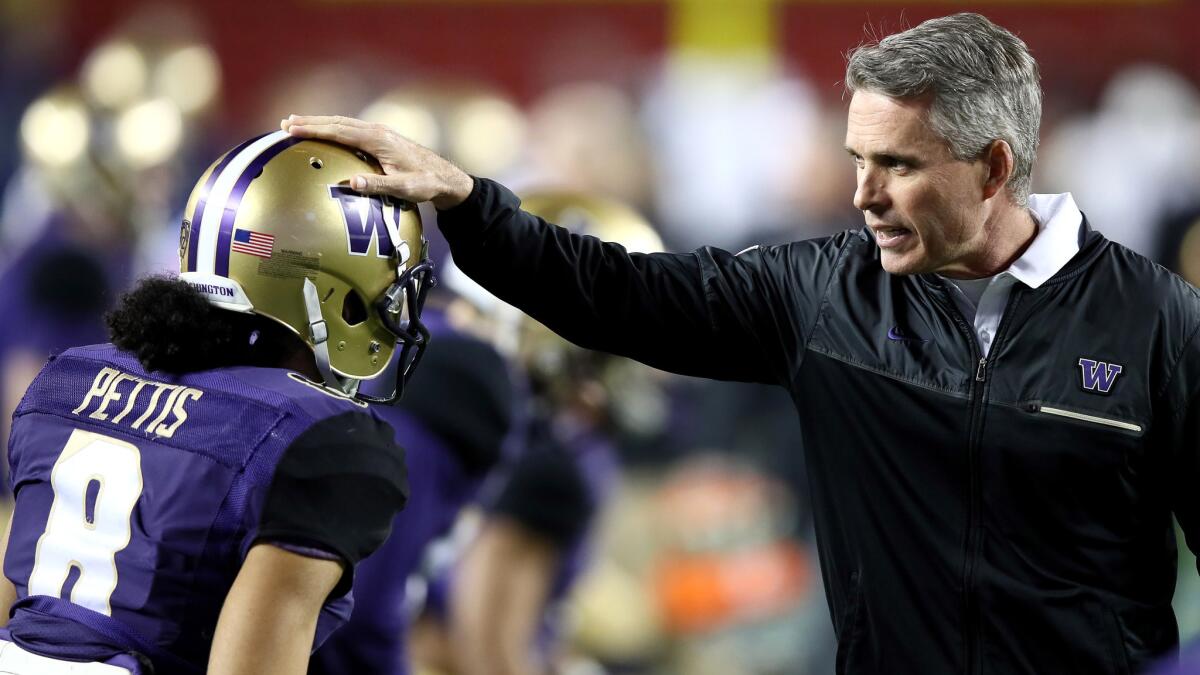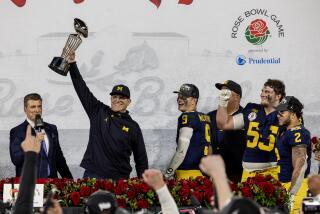Column: College Football Playoff committee takes a deep dive, comes up with Huskies

- Share via
The debate stretched late into Saturday night, with the men and women who control college football’s playoff system hashing over which teams should vie for the national title.
The selection committee took a preliminary vote, talked some more, then got some sleep before reconvening early Sunday morning.
“There was extensive discussion,” said Kirby Hocutt, the committee’s chairman. “There was extensive analysis.”
That’s what it took for the College Football Playoff to pick just four contenders after a season filled with close victories and upset losses.
Not that the committee needed much time to anoint undefeated Alabama at No. 1. Or to agree that one-loss Clemson should rise to the second slot after defeating Virginia Tech for the Atlantic Coast Conference title.
Even the decision to place Ohio State at No. 3 — though the Buckeyes did not qualify for the Big Ten Conference championship game — was relatively easy.
“The selection committee believes Ohio State has put together one of the best resumes of this college football season,” Hocutt said. “Three wins over CFP top 10 teams, including what possibly will be defined as the game of the year, the victory they had over Michigan.”
The real challenge was picking Washington for the fourth spot and leaving a resurgent Penn State on the outside looking in.
The Huskies had only one loss — to ninth-ranked USC — and a Pac-12 title, but faced questions about their strength of schedule. That’s what happens when you start the season against Rutgers, Idaho and Portland State.
Coach Chris Petersen said that waiting for the final word was nerve-racking.
“We were hopeful,” he told ESPN. “I know we felt like we deserved to be there, but there were so many things beyond our control.”
Penn State had two losses on its record but also pulled off the upset of the season, defeating Ohio State in late October. Almost as impressive, the Nittany Lions won the Big Ten championship with a second-half comeback against Wisconsin on Saturday.
Committee members watched that game together and were so conflicted afterward, they ended up comparing Washington and Penn State by way of offensive and defensive numbers and turnover margin.
As Hocutt put it, “we did a deep dive into all those statistical categories.”
The Huskies came away with a slight edge. The committee also expressed concern about Penn State’s 49-10 loss at No. 6 Michigan in late September.
“Washington was determined to be the better football team this season,” Hocutt said.
That won’t sit well with Big Ten fans who have argued, with good reason, that their conference played the best football in the country this fall. It also raises questions about the vague manner in which conference championships factor into the equation. No one seems to know for sure.
Regardless, Penn State Coach James Franklin responded graciously, accepting the consolation prize that came with the No. 5 slot — a trip to the Rose Bowl to face USC.
“Our guys would have loved to have been in the playoffs but they are also excited about the opportunity to play in a big bowl,” he told ESPN. “We’re still very appreciative.”
If anything, arguments over that final playoff spot – raging for weeks – triggered speculation about expanding the current system to eight teams.
No one should hold their breath on that one. A longer season would not sit well with some university administrators and might add fuel to the growing discontent among players who believe they should be paid for their efforts.
Also, the current system is in the midst of a lengthy contract.
Bill Hancock, the CFP’s executive director, said he is confident that four is the right number, adding: “I don’t anticipate any discussion about expanding.”
That won’t end the debate over how to weigh strength of schedule, conference titles and other criteria. When it comes to margin of victory, Hocutt insisted the committee relies more on observation than the final score.
“Sometimes a 3-21 game can be a very competitive game,” he said. “When you watch a game, you know it that was a competitive ballgame or not.”
All the clamor over the top spots overshadowed the committee’s other duties, which include helping to populate all the major bowls.
At the very top, Alabama will face Washington in the Peach Bowl and Clemson will play Ohio State in the Fiesta Bowl.
While the Rose Bowl gets USC and Penn State, the Sugar Bowl will feature No. 7 Oklahoma against No. 14 Auburn and the Orange Bowl has Michigan – which slipped out of the playoff picture with two late losses – against No. 11 Florida State.
The committee caught a break with the Cotton Bowl, which was obligated to match No. 8 Wisconsin against the highest-rated team from the lower Group of Five conferences.
Western Michigan and Navy were in a tight race for that honor. If the Midshipmen had defeated Temple on Saturday, the decision might have been delayed until after their game against Army next week, forcing other bowls down the line to wait.
But Navy lost and fell to No. 25 while Western Michigan won the Mid-American Conference championship, remaining undefeated and rising to No. 15.
The funny thing is, after all of college football’s twisting and turning over the years, officials trying various ways to create the truest national championship game, not all that much has changed.
At least not this fall.
The CFP’s playoff teams also occupied the first four slots in the latest AP top 25, the coaches poll and several of the computer rankings from the scrapped BCS system.
Maybe the biggest winner of the day was Coach Urban Meyer. Not only were his Buckeyes the only team to remain in the top four without playing this weekend, he also became a grandfather shortly before the final vote was announced.
After watching the selection show from a maternity ward where his daughter gave birth to a boy, Meyer seemed in no mood to deliberate the current system.
“It was a bizarre year,” he said. “It’s a year that I don’t really question anything.”
More to Read
Go beyond the scoreboard
Get the latest on L.A.'s teams in the daily Sports Report newsletter.
You may occasionally receive promotional content from the Los Angeles Times.










